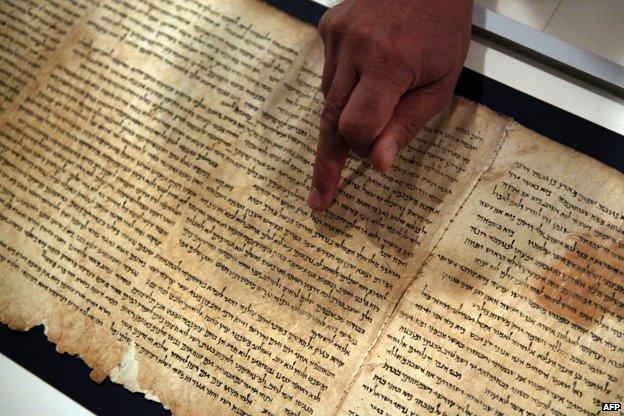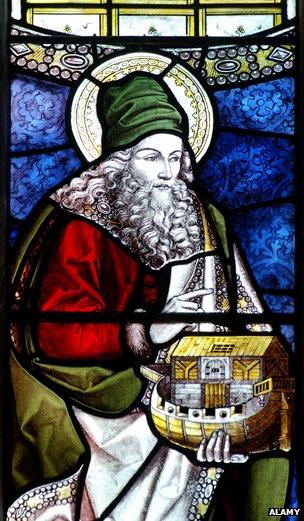The people who think Noah had albinism
- Published

Darren Aronofsky's epic Noah is now out in UK cinemas. Russell Crowe's portrayal of the Biblical figure has prompted criticism from religious groups, but there are also people who believe it misses a key detail - that Noah might have had albinism.
People with the condition have little or no colour, or pigment, in their eyes, skin and hair, and it can also result in severe visual impairment. It is an inherited condition. Those with pure white hair are likely to have the variant OCA1 (Occularcutaneous Albinism).
Though Crowe's Noah has a dirty grey beard, the Old Testament figure who was ordered by God to build an ark, is often depicted with a long white beard.
This in itself is no evidence of albinism but some people have seized on text from the Dead Sea Scrolls which elaborates further. Discovered between 1946 - possibly 1947 - and 1956 in a cave east of Jerusalem, they are thought to contain the earliest known manuscripts of some parts of the Hebrew Bible.

The Dead Sea Scrolls were found in a cave east of Jerusalem
In the scrolls, there is a description of Noah as a child "the flesh of which was white as snow, and red as a rose; the hair of whose head was white like wool, and long; and whose eyes were beautiful. When he opened them, he illuminated all the house, like the sun".
It doesn't exactly sound conclusive.
Mark Sanderson, chair of the UK's Albinism Fellowship group, says: "It's fair to say some people believe he had albinism because of his visual distinctiveness and obvious characteristics, but who knows. I think the link is quite tenuous though others might disagree."
The scroll translation comes via an article written by ophthalmology research professor Arnold Sorsby in the British Medical Journal in 1958. In it he attempts to find the root of a possible inherited genetic flaw by tracing Noah's family tree.
Though Sorsby's article has a serious tone, there is a section at the end that reads as if it were meant humorously. It's left people wondering if Sorsby was writing with his tongue firmly in his cheek.

Noah is often depicted with white hair
Others have suggested that the scroll text refers to a tradition of Noah's angelicness rather than a medical condition.
But the theory is cemented in the albinism community through the name of the US support group NOAH, standing for the National Organization for Albinism and Hypopigmentation.
President Mike McGowan says there were members who had heard about a possible link with the Biblical Noah when the organisation was founded, but is keen to distance himself from the ark-builder and stresses that NOAH is a secular organisation. The albinism support organisation in Germany is also known as NOAH.
The new film is said to bring out the dark side of the Noah story. While it might appear ironic, albinism is often used as a device to denote a dark character.
The Skinema website, external, set up to monitor the portrayal of skin conditions in movies, records many examples of the "evil albino" in films. These include Silas, the murderous monk from The Da Vinci Code, the evil Uber-Morlock from The Time Machine and the violent Bosie from Cold Mountain.
Sanderson is pleased Noah won't be on Skinema's list. "My personal view is that I'm glad Russell Crowe wasn't portrayed as having albinism because almost always when film-makers do it it's negative. I've rarely seen it done positively."
Follow @BBCOuch, external on Twitter and on Facebook, external, and listen to our monthly talk show